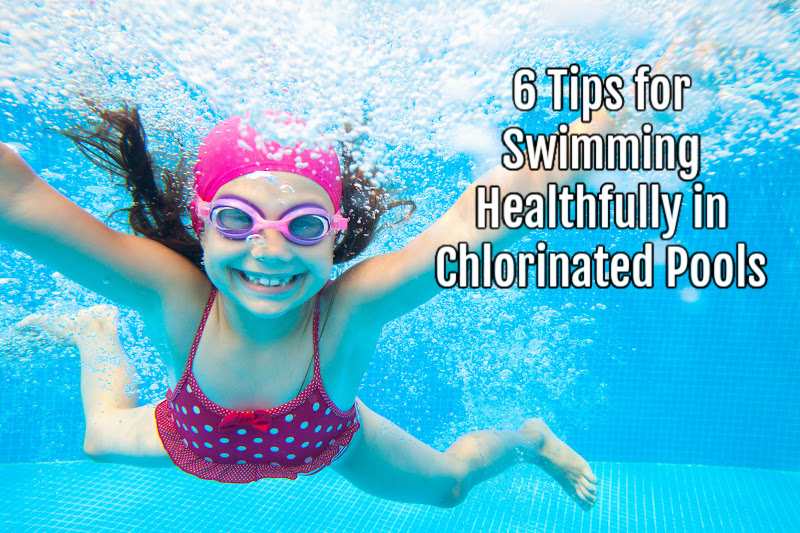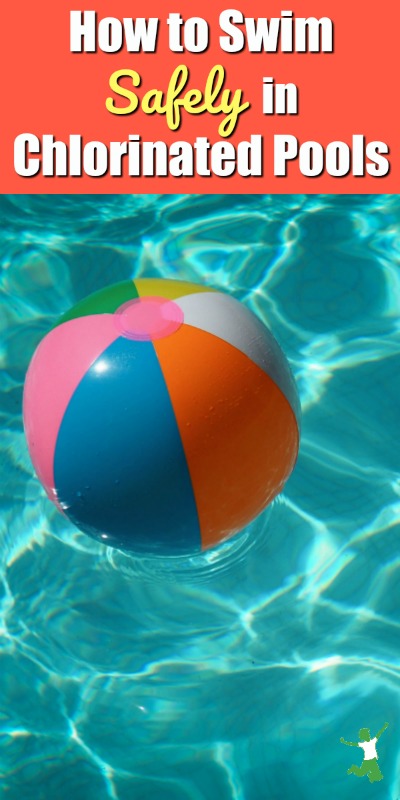The reasons why swimming in chlorinated pools is dangerous to health and the 6 steps to take to protect yourself and your family while still enjoying water fun all summer long.

The reasons why swimming in chlorinated pools is dangerous to health and the 6 steps to take to protect yourself and your family while still enjoying water fun all summer long.
An important topic to explore as we head into the summer season is chlorinated pools.
Chlorine is popular because it handles the three main jobs in keeping a swimming pool clean: It sanitizes (kills bacteria and germs), oxidizes (controls organic debris from perspiration and body oils), and deters algae. The chemical is unpopular, however, because it has a strong odor, reddens eyes, causes allergic reactions in some swimmers, and is a known carcinogen – meaning it has been linked to cancer!
Chlorine absorbs into your skin. Too much exposure to chlorine has been linked to major health problems including reproductive disorders and even birth defects. It can cause your skin and hair to dry out and over time too much exposure can even cause wrinkles.
Editor’s Note: Have you ever wondered why Olympic swimmers seem to have so many wrinkles at such young ages and most of the men start losing their hair so quickly? Could it, in fact, be caused by overexposure to chlorine for so many years and so many hours every day? Perhaps so.
When chlorinated pools are indoors, toxic gases such as nitrogen trichloride are released, which can be very dangerous. When we breathe in this gas it can cause severe damage to the lining of the lungs which could lead to respiratory problems or asthma. This toxic gas can be harmful at any age yet it poses the most risk to elderly people and small children.
So while chlorine used to disinfect swimming pools is widely recognized as a health hazard, not everyone has access to the ocean or a lake, or pools treated with ozone, ionizers, bromine, silver-cooper, or other alternatives which can frequently be much more expensive.
6 Tips to Protect Health in Swimming Pools
If you or your family members do choose to swim in chlorinated pools, some recommendations I’ve read are to:
1. Swim in outdoor chlorinated pools only if at all possible. It is much safer because the toxic gases are mostly eliminated in the open air.
2. Swim in chlorinated pools occasionally. It is regular exposure to chlorinated pools that presents the greatest risk to health.
3. Shower immediately before and after using a natural Castile soap.
4. Drink plenty of home-filtered water (better than bottled!) beforehand so that you are well hydrated.
5. Consider wearing a mask and snorkel to shield your eyes – and even a wetsuit, if you are willing to go that far!
6. Get fresh air afterward so you don’t continue to inhale the fumes, and can clear your lungs.
Why shower immediately before swimming in a chlorinated pool?
Julie Deardorff explains in her article published in the Chicago Tribute, “Another important reason to shower is that our bodies generally contain residue from consumer products, including perfume, make-up, body lotion, shampoo, and sunscreen.
When the chemicals used to disinfect the pool mix with organic matter (sweat, hair, urine) or nitrogen-rich substances (commonly found in consumer products) it can create a more toxic agent, said Michael Plewa, a professor of genetics at the University of Illinois whose new research has linked pool chemicals to health problems, including asthma and bladder cancer.”
Red, burning, itchy eyes and skin?
What I’ve read is that the presence of chloramines can cause reactions such as red, burning, irritated eyes: Chloramines form when chlorine reacts with ammonia. Ammonia enters the pool through sweat and urine. It is important to teach children not to urinate in pool water [even though it is chlorinated].
Also, showering before swimming can remove excess sweat that interacts with chlorine. My understanding is that if the sweat is on your skin, and hasn’t been rinsed off first in the shower, the chlorine will interact with the sweat on your skin as you enter the pool, and may result in some folks getting itchy skin.
So, what do you think? Do the benefits and joy of swimming and playing in a pool outweigh the health risks of chlorine?

Additional articles on this topic
The Dangers of Chlorine
Asthma In Swimmers
Swimming Pools May Increase Cancer Risk
The Hidden Danger of Swimming Pools
Swimming Pool Alternatives to Chlorine
Water Birth Dangers








I am an asthmatic. I swam for many years and was sick for many years. I can’t swim now for health reasons. My asthma has never been better. If I swim in a public pool I have a severere reaction late in the night. My sinuses explode. I can’t breathe through my nose and the pressure in my sinuses is unbearable. I go to sleep not breathing very well. I have a young son who swims but I may pull the plug on his swimming reading this article.
Yes, you’re perfectly safe!
-lifeguard and water safety instructor
As a licensed water treatment operator, I had to learn all the potential ill health effects of Chjorine. (Sodium Hypochlorite) Jist a Warning!! “Stay Away from this Stuff” It is harmful. Don;t drink chlorinated water that is supplied by most cities.
i used to work in a pool…….there is a 5 inch cloak of chlorine gas floating on the surface of the pool…each time you take a breath….you breathe it in…….also the reason you get red itchy eyes is not just the chlorine……its the floating skin in the water going in your eyes……the chlorine merely enhances the the irritation…..swim in the sea and absorb all the minerals.
I was concerning about my skin itchiness, specially swimming in super clear water with extra chlorine. And thank you for mentioning about toxic air produced by chlorine. Because swimming is mouth breathing. Need to be more concerned. I hope we might have new safe products replaced chlorine. And new skin care products for swimming.
I recently moved into a 55+ Active community. The indoor sports complex has a very large indoor swimming pool that constantly wreaks of chlorine fumes. You can smell it in the gym while you are working out, which can’t be good for your lungs or body. Do you know of anyway to reduce the fumes?? I would like to work out in the gym, but cannot tolerate the fumes.
Just want ti know if im safe swimming naked in our clorinated pool
Water got into the container of chlorine which was not properly closed. the container was outside in the open air. the water seeped into the container soaking the chemical along the side right to the bottom.
Tried to salvage the dry part of the chlorine but still water had contaminated a good part of it.
What danger would it be, and how to avoid any problems that could arise.
Salt pools are chlorine pools. As salt water flows through the generating cell the salt is converted into sodium hypochlorite, the active killing form of chlorine. Whether the salt pool has more or less chlorine is a function of the setting on the generator (usually expressed as a percentage. 60% means the generator runs 60% of each hour.), the cell size which determines its output, and the bather load in the pool.
Thank you for spreading the awareness with detailed scientific facts. God bless!